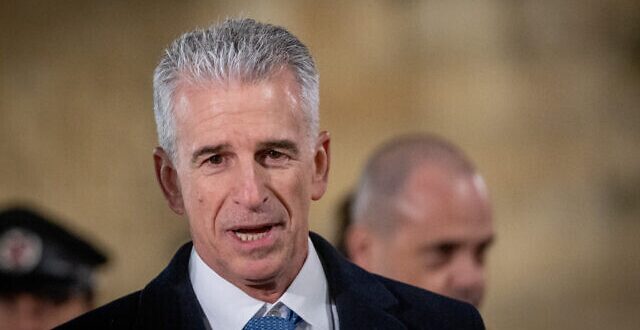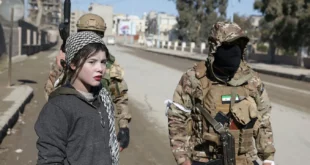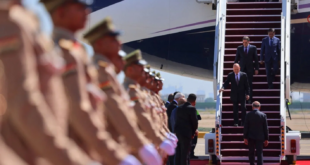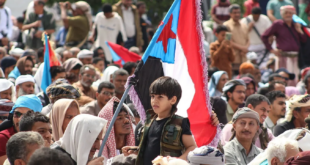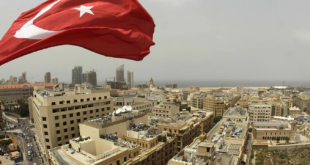In Doha, Blinken says mediators hope to ‘capitalize’ on Sinwar’s death to advance agreement, though Hamas’s position is yet unknown
Mossad chief David Barnea will travel to Doha on Sunday to try to restart discussions on a deal to release Israeli hostages held in Gaza and halt the war between Israel and Palestinian terror group Hamas, Prime Minister Benjamin Netanyahu’s office said in a statement Thursday evening.
Meanwhile, an Egyptian security delegation met with a delegation of Hamas leaders in Cairo as part of the same efforts, Egypt’s state-affiliated Al Qahera News TV said, citing an unnamed official source.
Netanyahu’s office also put out a statement saying he welcomed Egypt’s willingness to advance a deal.
A senior Hamas official told AFP that the delegation led by the terror group’s deputy Gaza chief Khalil al-Hayya discussed “ideas and proposals” related to a truce with Egyptian officials.
“Hamas has expressed readiness to stop the fighting, but Israel must commit to a ceasefire, withdraw from the Gaza Strip, allow the return of displaced people, agree to a serious prisoner exchange deal and allow the entry of humanitarian aid into Gaza,” the official said.
In Doha, Barnea will meet with CIA chief Bill Burns and Qatari Prime Minister Sheikh Mohammed bin Abdulrahman Al Thani.
“At the meeting, the parties will discuss the various options for advancing the negotiations for the release of the hostages held by Hamas, against the backdrop of recent developments,” the PMO statement said.
Families of the 101 hostages held by Hamas in Gaza urged Netanyahu to give Israel’s negotiators a wide mandate to secure a deal for their return. “The hostages’ families call on the public to support their unified appeal to the prime minister: grant the negotiating team broad authority at the Doha summit to secure a deal for returning all hostages,” the Hostages Families Forum said in a statement.
US Secretary of State Antony Blinken is currently in Doha amid attempts to restart talks. Blinken said Thursday that he anticipated negotiators would come together in the coming days.
Hostage talks have been largely stalled for over two months, with the US publicly blaming Hamas for refusing to engage, while Egypt and Qatari mediators have privately blamed Israel, according to officials familiar with the matter.
The Biden administration has argued that last week’s killing of Hamas leader Yahya Sinwar by Israel may provide an opening for a revival of talks for a deal.
Speaking alongside Qatar’s Prime Minister Mohammed Al Thani, Blinken said the two discussed options to move the negotiations forward, in hopes of ending the fighting and bringing about the release of the remaining 101 hostages that have been held captive in Gaza.
The war in Gaza began on October 7, 2023, when Hamas and other Palestinian terror groups invaded southern Israel and killed over 1,200 Israelis and foreign citizens, most of them civilians, and took 251 hostages into Gaza.
“We talked about options to capitalize on this moment and next steps to move the process forward, and I anticipate that our negotiators will be getting together in the coming days,” Blinken told reporters.
He argued that Israel had accomplished the strategic goal that it had set out for itself at the beginning of the war just over a year ago: making sure that October 7 can never happen again, by effectively dismantling Hamas and bringing its leaders to justice.
Asked whether negotiators are looking at new formulas, Blinken said they are “looking at whether there are different options that we can pursue to get to a conclusion,” and that they “haven’t yet really determined whether Hamas is prepared to engage, but the next step is getting the negotiators together… we’ll certainly learn more in the coming days.”
“The fundamental question is: Is Hamas serious? My hope is that — again, in our judgement, Mr. Sinwar was the biggest obstacle to actually concluding an agreement. My hope is that now their minds will be concentrated, and we can get there and make progress.”
He also announced another $135 million in aid for the Palestinians in Gaza and the West Bank, which he said brings the US total to $1.2 billion since the war began.
Blinken said Israel had made some progress in allowing more humanitarian aid into Gaza since he and Defense Secretary Lloyd Austin sent their Israeli counterparts a letter warning that continued US offensive weaponry was at risk if Jerusalem didn’t take significant steps to address the humanitarian crisis in the Strip within 30 days. However, the secretary stressed that much more must be done by Israel.
The Qatari PM said his country has recently “re-engaged” with Hamas leaders in Doha since Sinwar was killed, but that he sensed the Palestinian terror group’s position has not changed.
The US, Egypt and Qatar have brokered months of indirect talks between Israel and Hamas, trying to strike a deal in which the terror group would release dozens of hostages in return for a lasting ceasefire and the release of Palestinian security prisoners. In recent months, however, the negotiations were brought to a complete standstill after no deal was reached.
Sinwar was known to lead a hard line in talks, seeking to ensure an end to the war and to maintain Hamas rule in Gaza — demands Israel refused.
Blinken arrived in Qatar after a brief visit to Israel to discuss developments in Gaza and Lebanon, as well as Israel’s anticipated strike on Iran in retaliation for Tehran’s October 1 ballistic missile attack. This was the secretary of state’s 11th trip to the region since the Hamas attacks on October 7 of last year.
Though recent months have seen Israel wind down many of its operations in Gaza, it recently launched a fresh assault in northern Gaza’s Jabaliya, leading to intense fighting there, and the evacuation of tens of thousands of civilians.
Pressed on the so-called Israeli General’s Plan that envisioned the IDF laying siege to northern Gaza to pressure remaining Hamas forces there, Blinken said: “The US fully and firmly rejects it” while adding that “the government of Israel says that it is not the policy of Israel and rejects the plan.”
Blinken had pressed Prime Minister Benjamin Netanyahu to publicly reject the plan during their meeting in Jerusalem on Tuesday, but the premier balked at doing so, frustrating Washington, according to a US official.
On Thursday, a senior Hamas official said that if an agreement is reached, two Israeli hostages who are dual Russian citizens will be among the first to be released during the eventual hostage deal.
Moussa Abu Marzouk, a Hamas politburo member, told the Russian state news agency RIA after talks with Russian Deputy Foreign Minister Mikhail Bogdanov in Moscow that the release of Alexander (Sasha) Trufanov and Maxim Herkin would be a “priority,” but only as part of a ceasefire deal and an exchange of hostages for Palestinian prisoners.
Abu Marzouk noted that Trufanov is being held by the Palestinian Islamic Jihad, which has released two propaganda videos of him. Abu Marzouk called Trufanov an Israeli officer and Herkin a former soldier.
Trufanov, 30, is an engineer employed at Annapurna Labs, an Israeli microelectronics company purchased by Amazon. He was kidnapped on October 7 from Kibbutz Nir Oz along with his mother Yelena, grandmother Irena Tati, and girlfriend Sapir Cohen — both of whom were released in a hostage deal in late November. His father, Vitaly Trufanov, was murdered on October 7 in the Hamas onslaught.
Herkin, 35, was kidnapped from the Nova festival on October 7. Abu Marzouk claimed that Herkin’s family secured him a Russian passport after he was captured, in a bid to push for his release.
Abu Marzouk also discussed post-war Gaza with Russia, and urged Moscow to push Palestinian Authority President Mahmoud Abbas to begin negotiations on a national unity government.
“We discussed issues related to Palestinian national unity and the creation of a government that should govern the Gaza Strip after the war,” the Hamas official was quoted as saying by RIA.
Abu Marzouk said that Hamas had asked Russia to encourage Abbas, who is attending the BRICS summit in Kazan, to start negotiations about a unity government, RIA reported.
The PA, controlled by Abbas’s Fatah political faction, has long had a strained relationship with Hamas, which ousted Fatah from Gaza in a bloody coup in 2007. At the same time, it has been reluctant to strongly condemn Hamas for its October 7 atrocities.
 Eurasia Press & News
Eurasia Press & News
